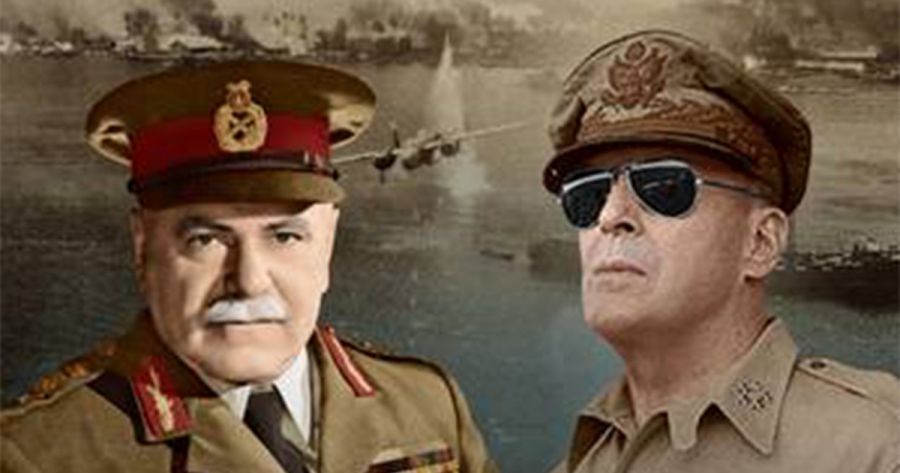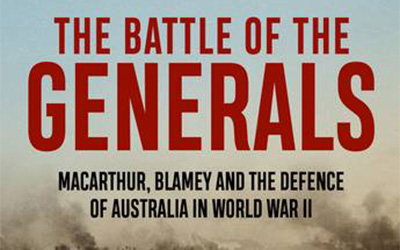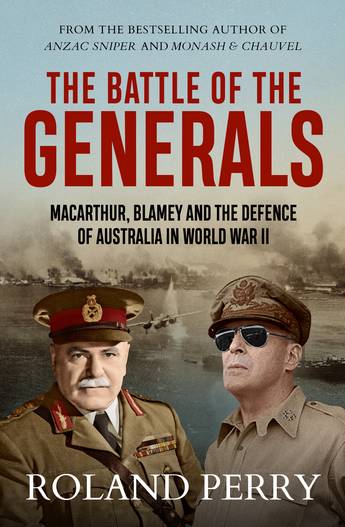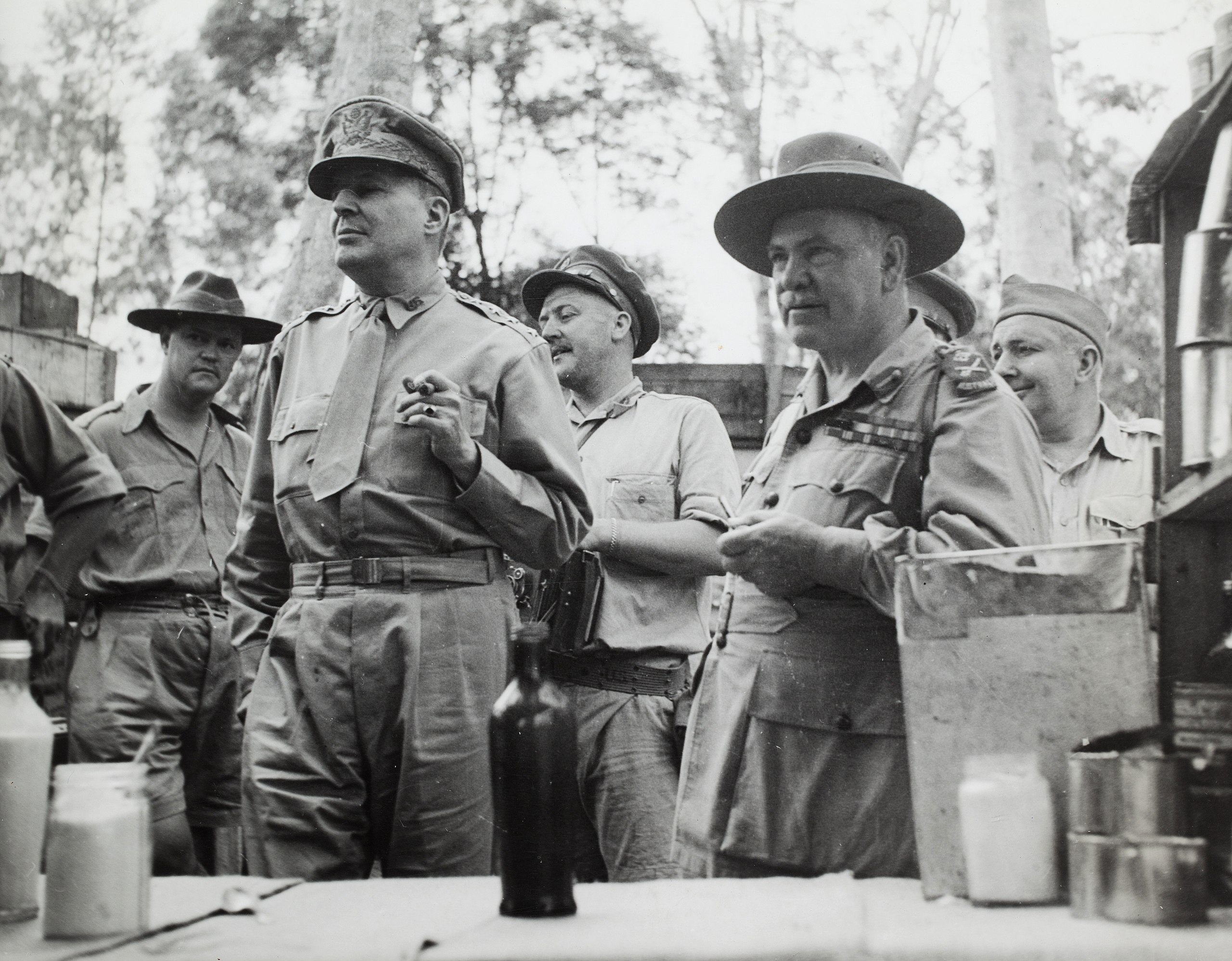
- Free Article: No
- Contents Category: Military History
- Review Article: Yes
- Article Title: On the beach
- Article Subtitle: The story of two generals
- Online Only: No
- Custom Highlight Text:
What an uneven battle! Thomas Blamey, the little guy, rural-bred, rough, rumbunctious, distrusted; Douglas MacArthur, nobly bred, imperious, destined for greatness, the darling of his own heart. Roland Perry shows the true picture. MacArthur (1880-1964) was a scheming, narcissistic, lying braggard and manipulator. Blamey (1884-1951) fought to keep his Australians from fighting with the Americans, and tried, often with little effect, to influence his prime minister to act in the interests of the Australian troops and the Australian people, while displaying worrying moral failures of his own.
- Featured Image (400px * 250px):

- Alt Tag (Featured Image): Michael McKernan reviews ‘The Battle of the Generals: MacArthur, Blamey and the defence of Australia in World War II’ by Roland Perry
- Book 1 Title: The Battle of the Generals
- Book 1 Subtitle: MacArthur, Blamey and the defence of Australia in World War II
- Book 1 Biblio: Allen & Unwin, $34.99 hb, 370 pp
- Book 1 Cover Small (400 x 600):

- Book 1 Cover (800 x 1200):

- Book 1 Readings Link: https://www.readings.com.au/product/9781761470493/the-battle-of-the-generals--roland-perry--2024--9781761470493#rac:jokjjzr6ly9m
Blamey’s road to the top job in the Australian Imperial Force (AIF) was made much easier by his career in World War I, where he served as chief-of-staff to General John Monash. Monash was a great admirer and supporter of Blamey. Reading Monash’s report on Blamey’s performance shows why, even after Blamey’s turbulent career as Victoria’s Chief Commissioner of Police (1925-36), Menzies selected him as Commander of the Second AIF in 1939. Menzies believed that Blamey was the only man in contention.
Perry makes an interesting and unusual point about Blamey: ‘in September 1918 [Blamey] had twice as many Americans under his control than MacArthur did during World War I’. Did MacArthur fear and resent Blamey as the better, brighter, more successful soldier?
MacArthur’s ambition was magnificent, never matched by his achievements. He would use victory in the Pacific, for which he alone would be responsible, as a stepping stone to his ultimate prize: the presidency of the United States of America. He could brush Blamey aside quite easily, but, as Perry shows, it was the US Navy that played the crucial role in defeating the Japanese. Admiral Chester W. Nimitz was the true victor in the Pacific theatre, though MacArthur merely ignored him.
The key to MacArthur’s mastery over Blamey was his deception, control, and manipulation of Australia’s wartime prime minister, John Curtin (1941-45). Meeting him in Canberra for the first time, the recently appointed Supreme Commander of Southwest Pacific announced grandly: ‘We’ll see this thing through together. You take care of the rear, and I’ll handle the front.’
Perry believes that Curtin was, ‘to a degree, dazzled by the general’. MacArthur found Curtin direct, honest, and, crucially, pliable. Indeed, this book is, on the whole, deeply critical of Curtin, suggesting that the bedazzling unsettled Curtin’s normally solid and deliberate judgement.
Perry might have been kinder. Curtin was a shrewd thinker and a reserved man. He accepted the adage ‘in politics if you want a friend, get a dog’. Curtin could not easily have reached the view that MacArthur was lying to and manipulating him. Perry makes a strong case that this was, if fact, MacArthur’s intention.
When Japan launched its attack on Pearl Harbor in December 1941, Curtin recognised that only the United States could prevent Australia from being vanquished in the field and, quite possibly, invaded. He devoted himself to ensuring that the Americans did everything in their power to defeat the Japanese, even as they joined the European war.
 General Douglas MacArthur and General Thomas Blamey, Papua, 1942 (Mitchell Library, State Library of New South Wales)
General Douglas MacArthur and General Thomas Blamey, Papua, 1942 (Mitchell Library, State Library of New South Wales)
Though Curtin quickly united the Australian people for an ‘all-in’ war effort, he did not have a strong hand in negotiations with the Americans. It was his task to keep the Pacific war at the forefront of President Franklin D. Roosevelt’s mind. He could not risk provoking any sort of conflict or disagreement with MacArthur. So Curtin went about the task of soothing and encouraging the Supreme Commander. Readers of this book may be startled to learn that MacArthur and Curtin fantasised about going on holiday together, with their wives, when the war was over. Curtin’s death in July 1945 dashed these dreams, but the plan seems remarkably improbable.
Throughout all this, Blamey was putting in the hard yards. He was a shrewd commander, a good judge of men, a thoughtful strategist. He was quick to spot his mistakes and just as quick to rectify them. Perry’s is a warm and approving account of Blamey. But no one can excuse Blamey’s appalling lack of judgement and decency at Koitaki. ‘A sombre mood enveloped the cricket ground,’ Perry writes, as Blamey, scowling, berated the unsuspecting twenty-first and thirty-ninth brigades. They believed that their extraordinary fighting on the Kokoda Track was to be praised and their achievement celebrated. Instead, they were abused in savage terms by Blamey. This was undoubtedly Blamey’s lowest point, which Perry works hard, though ultimately unsuccessfully, to excuse by adducing the misinformation and misunderstandings Blamey had accepted uncritically.
Even so, Perry makes a strong case for regarding Blamey as the clear winner in the ‘battle of the generals’. His weaknesses and foibles, Perry writes, were outweighed by his strengths, fortitude, and care for his country. He was the necessary tough commander in a brutal war: ‘his elevation to field marshal was an acknowledgement of his grand contribution to the Australian military in two world wars’.
Of MacArthur, Blamey said ‘the best and the worst things you hear about him are both true’. For his part, President Dwight Eisenhower, when asked if he knew MacArthur, quipped that he had ‘studied drama under him for some years’.
This enjoyable, clearly argued, comprehensive, and highly readable book allows readers to appreciate the pressures of war on its leaders, and their weaknesses and strengths.


Comments powered by CComment